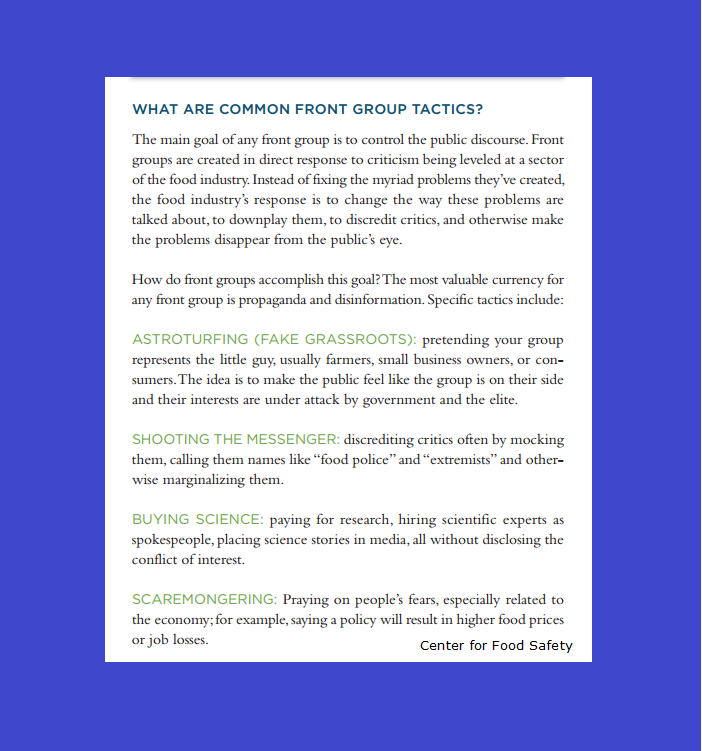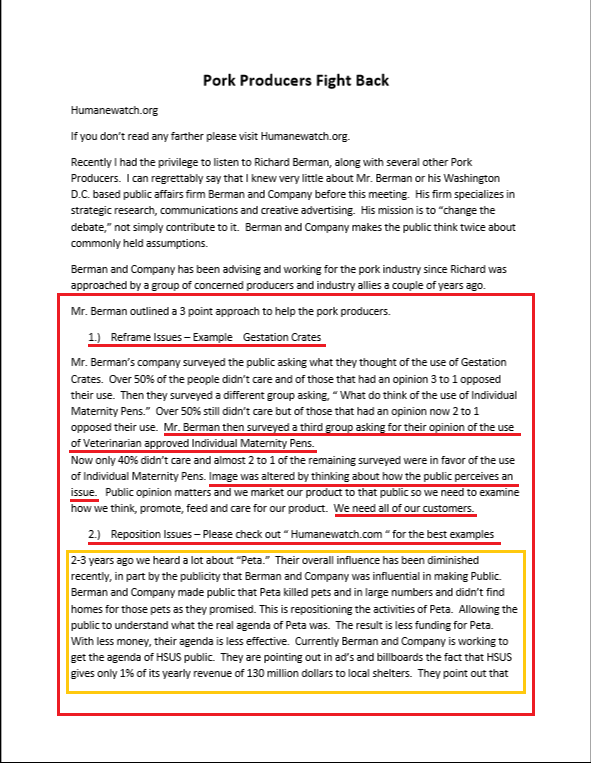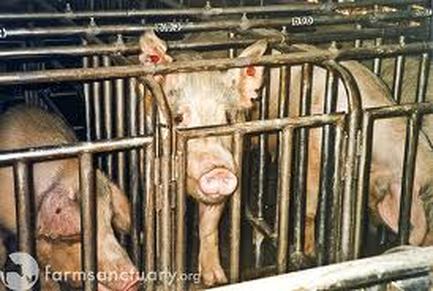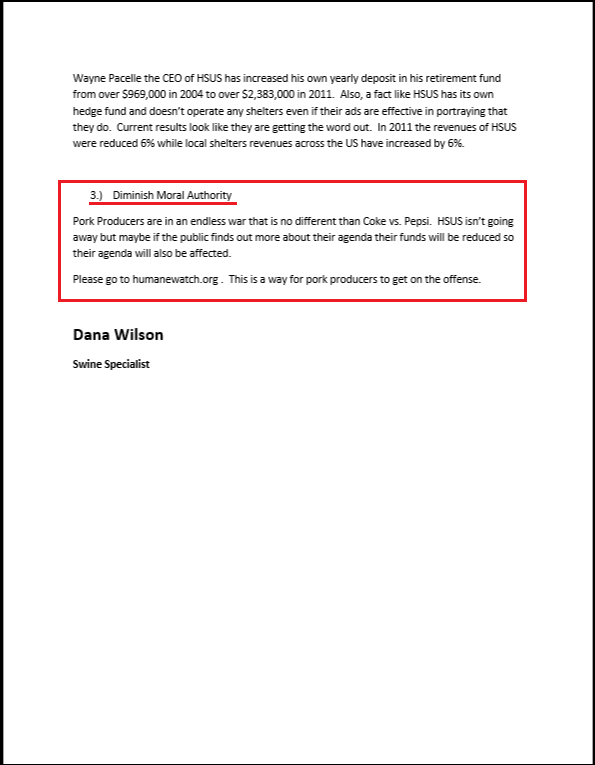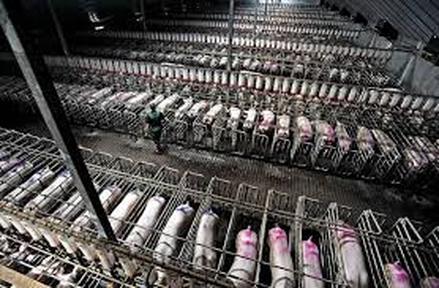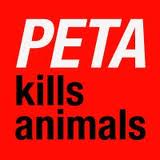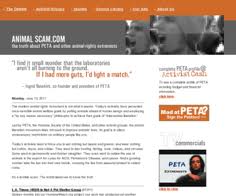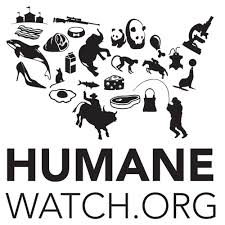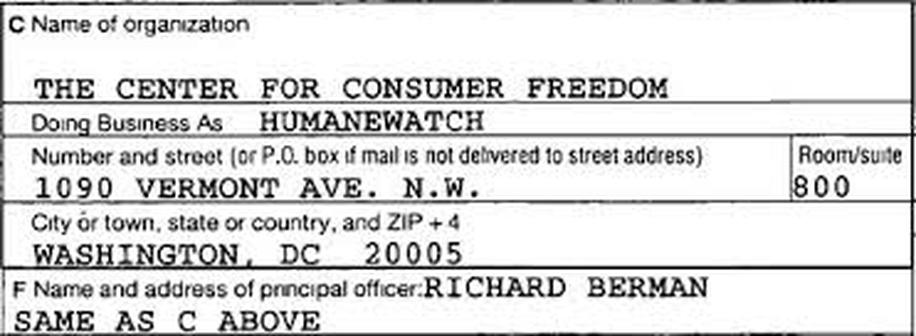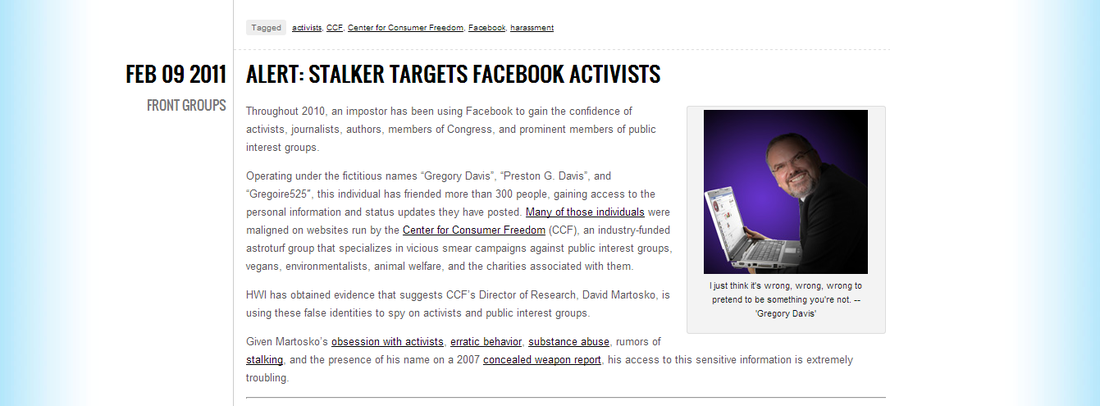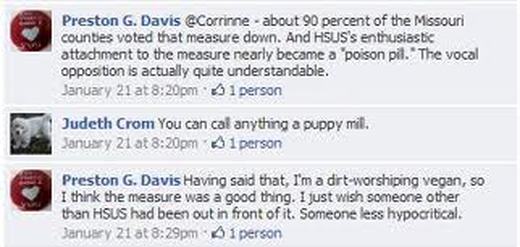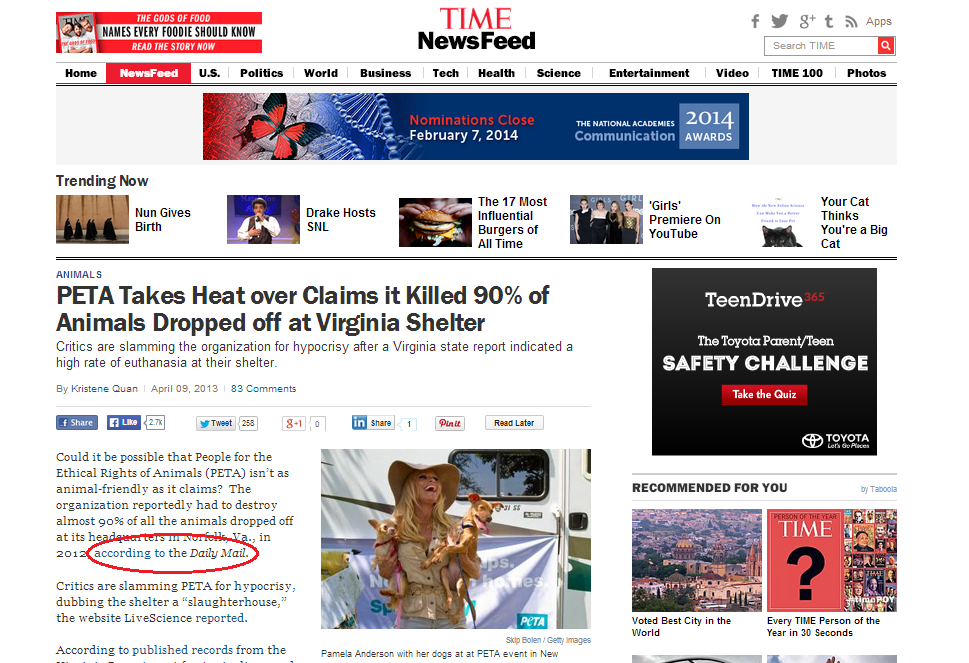The Center for Consumer Freedom's War Against Animals
"In this realm of opinion molding, Berman is a pioneer. He maintains one of the longest-running and most influential enterprises in the field. His attacks typically are carefully worded so that each sentence can be defended as narrowly accurate. But his critics say many are constructed in a way that distorts the overall picture”--Michael Kranish, The Boston Globe
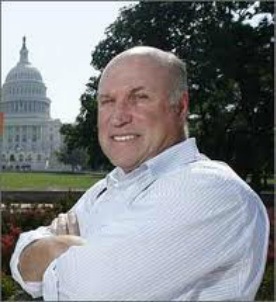 Richard Berman
Richard Berman
Richard Berman: The Man Behind the "Center for Consumer Freedom"
Most of us are familiar with the concept of "trade associations," or above-board lobbying organizations that provide platforms where corporations within specific industries can interact in ways that are mutually beneficial to each groups' members. Trade associations are largely openly funded by their members, and they function to give matters of public image and legislative initiatives a unified voice. Generally speaking, trade associations are up-front about who they represent and about their financial motivations.
Industries also utilize "front groups" to protect their economic interests. Front groups function to protect corporations under the guise of consumer advocacy groups, with the goals of controlling public discourse and mitigating industry criticism. When industries create problems, front groups respond by changing the way the consumers view the problems. By down-playing an industry's problems or discrediting an industry's critics ("shooting the messenger"), front groups can sometimes successfully erase problems from the public's memory altogether.
Trade associations are up-front about their membership and often have names that describe exactly whose economic interests they're protecting. For example, one of the organizations that protects the financial and legislative interests of American pork producers is called the "National Pork Producer's Council." Another example would be the "Cattleman's Beef Association," a trade group that represents the American beef industry in matters of legislation and public image.
While front groups are also put in place to protect the financial interests and public images of corporations and industries, they use deceptive names that confuse who it is that they're actually working for and what it is they're actually doing. Front groups cultivate the appearance of representing sympathetic characters like "consumers," or "farmers," rather than disclosing that they're protecting industries with clear-cut economic interests. Front groups allow industries to viciously attack their critics without fear of damaging the reputations they've spent millions of dollars cultivating.
This is the story of how Richard Berman, an ambitious public relations operative and corporate attorney, rallied major players within the tobacco, food, and beverage industries to target what he wanted the public to believe was “excessive government regulation” and a growing threat to “free-will,” springing up from within the private sector by way of environmental advocacy organizations, health and wellness advocates, and animal rights groups like People for the Ethical Treatment of Animals.
Back in the mid 1990’s, Berman created a template of attacks that would, according to the public relations operative, “unite the restaurant and hospitality industries in a campaign to defend their consumers and marketing programs against attacks from anti-smoking, anti-drinking, anti-meat, etc. activists.” He then pitched the idea in a letter to tobacco giant Phillip Morris.
Founded on an initial donation of $600,000 from Phillip Morris, the Center for Consumer Freedom’s client list would eventually boast such industry heavy-hitters as Monsanto, Tyson Foods, Coca-Cola, Wendy’s International, Hormel Foods Corp., Standard Meat Co., and Covance Laboratories--one of the largest animal breeding and testing facilities in the world--of which Phillip Morris is a longstanding client.
In 1996, Berman’s front group became the incorporated “charitable” entity known as the “Center for Consumer Freedom,” and began digging into its mission of “protecting the rights of consumers” as they pertained to the financial interests of the tobacco, food, and beverage industries.
And in 2005, when the Center for Consumer Freedom stumbled upon PETA’s Virginia Department of Agriculture and Consumer Services animal reporting summary numbers, in the interest of neutralizing one of the tobacco, food, and beverage industries' most outspoken critics, the front group set out to spin the dull straw of PETA’s shelter statistics into a currency that would keep their anti-animal campaign afloat, and as we might expect, they took liberties with the truth towards those interests.
The Center for Consumer Freedom's Bastard Love-Child, "PETA Kills Animals," is Born
Launching a website attacking the credibility of an animal rights organization is exactly the sort of thing we might expect a front group that protects the financial interests of the food, beverage, and tobacco industries to do. In May of 2005, the Center for Consumer Freedom launched the “petakillsanimals.com” website, a composite of PETA’s 2004 VDACS animal reporting summaries and an array of intentionally stark, red, and uncomfortable graphics claiming that the animal rights group was “killing” most of the animals it received into its shelter.
With regards to mitigating PETA’s impact on food and beverage industry bottom lines, the Center for Consumer Freedom was generating a working limb. If PETA--the world’s largest animal rights organization could kill animals, then the CCF’s tobacco, food, and beverage industry donors could certainly confine, deprive, and violently disassemble animals for their lucrative parts, and do it in good conscience.
Reeling from the CCF’s disquieting new website, PETA immediately issued a statement explaining that most of the animals entering its Norfolk facility were “broken beings,” and that the organization referred every healthy, cute, young animal it could to traditional animal shelters. But the Center for Consumer Freedom wasn't about to pass up the opportunity to exploit the apparent hypocrisy of the animal rights group ending the lives of animals, not based on the technicality that PETA might be acting in the animals’ best interests.
But Things Would Soon Get Even Worse for PETA
Just one month after the Center for Consumer Freedom’s anti-PETA website made its debut, two of PETA’s Community Animal Project volunteers were arrested in North Carolina, after they were caught putting animal remains in a private grocery store dumpster.
The public was generally unaware of PETA’s Community Animal Project’s work in North Carolina, and why they were there: in 2000, a law enforcement officer witnessed these disturbing events at the Bertie County, North Carolina animal shelter, and contacted PETA with photographs--a starving dog eating the remains of a dead kitten, a dog lying near death in his flooded enclosure, and rotting puppies lying on the floor outside the shelter’s dilapidated gas chamber. And more.
Outraged by the photos depicting the disturbing conditions at the Bertie County animal shelter, PETA galvanized and dispatched a team to North Carolina. PETA staff and volunteers went to work immediately to improve the conditions at the shelter, and PETA sent experts to talk to county officials about ending their use of gas chamber and firearm euthanasia.
Under enormous pressure from PETA and its supporters, four North Carolina pounds and shelters entered into agreements with the animal rights organization to improve pound conditions for animals, but county officials refused to budge on the gas chamber issue.
PETA began working closely with the shelters that year, pouring over $300,000 into bringing the shelters up to code--even building safe animal housing from the ground up. PETA contracted the services of local a veterinarian who would humanely euthanize animals who would otherwise be suffocated to death in a gas chamber at the Hertford County pound.
The animal rights organization tried to persuade the remaining three counties to allow local vets to humanely euthanize their animals as well--on PETA's dime--but for whatever reason the shelters’ officials refused. They would allow PETA to remove and euthanize the animals themselves and at their own expense however, and transport their remains back to Virginia for cremation.
Every week, sometimes several times a week, PETA staff and volunteers would make the hours-long trek to North Carolina to clean kennels, feed animals, save as many adoptable animals as they could, and humanely euthanize the ones they would not be able to find homes for. Sick and injured animals on stray holds, who would typically be left to languish in cages, were transported by PETA staff to local veterinarians for treatment.
In the words of Daphna Nachminovitch, the head of PETA’s cruelty investigation department, the Community Animal Project volunteers, “broke a matter of trust,” when they acted well outside of PETA’s stated protocol and disposed of the North Carolina pound animals they had euthanized that day, in a private grocery store trash dumpster.
Not surprisingly, Richard Berman would take full advantage of the confusion surrounding the incident to forward his fresh new campaign to discredit the animal rights organization, taking liberties with the truth to create a disturbing and enduring storm of disinformation that would haunt PETA for a very long time.
Nothing Richard Berman says or does should surprise anyone. Industries do battle this way every day. Companies that profit from the production of gas-guzzling luxury cars, wage wars against activists and scientists who are getting the message out there that the Earth is heating up fast, and that consumers' choices factor heavily into it. Corporations that profit from the confinement, concentration, deprivation, and violent disassembly of animals, develop strategies to mitigate threats that health advocates, environmental groups, and animal rights organizations pose to their bottom lines.
Most of us are familiar with the concept of "trade associations," or above-board lobbying organizations that provide platforms where corporations within specific industries can interact in ways that are mutually beneficial to each groups' members. Trade associations are largely openly funded by their members, and they function to give matters of public image and legislative initiatives a unified voice. Generally speaking, trade associations are up-front about who they represent and about their financial motivations.
Industries also utilize "front groups" to protect their economic interests. Front groups function to protect corporations under the guise of consumer advocacy groups, with the goals of controlling public discourse and mitigating industry criticism. When industries create problems, front groups respond by changing the way the consumers view the problems. By down-playing an industry's problems or discrediting an industry's critics ("shooting the messenger"), front groups can sometimes successfully erase problems from the public's memory altogether.
Trade associations are up-front about their membership and often have names that describe exactly whose economic interests they're protecting. For example, one of the organizations that protects the financial and legislative interests of American pork producers is called the "National Pork Producer's Council." Another example would be the "Cattleman's Beef Association," a trade group that represents the American beef industry in matters of legislation and public image.
While front groups are also put in place to protect the financial interests and public images of corporations and industries, they use deceptive names that confuse who it is that they're actually working for and what it is they're actually doing. Front groups cultivate the appearance of representing sympathetic characters like "consumers," or "farmers," rather than disclosing that they're protecting industries with clear-cut economic interests. Front groups allow industries to viciously attack their critics without fear of damaging the reputations they've spent millions of dollars cultivating.
This is the story of how Richard Berman, an ambitious public relations operative and corporate attorney, rallied major players within the tobacco, food, and beverage industries to target what he wanted the public to believe was “excessive government regulation” and a growing threat to “free-will,” springing up from within the private sector by way of environmental advocacy organizations, health and wellness advocates, and animal rights groups like People for the Ethical Treatment of Animals.
Back in the mid 1990’s, Berman created a template of attacks that would, according to the public relations operative, “unite the restaurant and hospitality industries in a campaign to defend their consumers and marketing programs against attacks from anti-smoking, anti-drinking, anti-meat, etc. activists.” He then pitched the idea in a letter to tobacco giant Phillip Morris.
Founded on an initial donation of $600,000 from Phillip Morris, the Center for Consumer Freedom’s client list would eventually boast such industry heavy-hitters as Monsanto, Tyson Foods, Coca-Cola, Wendy’s International, Hormel Foods Corp., Standard Meat Co., and Covance Laboratories--one of the largest animal breeding and testing facilities in the world--of which Phillip Morris is a longstanding client.
In 1996, Berman’s front group became the incorporated “charitable” entity known as the “Center for Consumer Freedom,” and began digging into its mission of “protecting the rights of consumers” as they pertained to the financial interests of the tobacco, food, and beverage industries.
And in 2005, when the Center for Consumer Freedom stumbled upon PETA’s Virginia Department of Agriculture and Consumer Services animal reporting summary numbers, in the interest of neutralizing one of the tobacco, food, and beverage industries' most outspoken critics, the front group set out to spin the dull straw of PETA’s shelter statistics into a currency that would keep their anti-animal campaign afloat, and as we might expect, they took liberties with the truth towards those interests.
The Center for Consumer Freedom's Bastard Love-Child, "PETA Kills Animals," is Born
Launching a website attacking the credibility of an animal rights organization is exactly the sort of thing we might expect a front group that protects the financial interests of the food, beverage, and tobacco industries to do. In May of 2005, the Center for Consumer Freedom launched the “petakillsanimals.com” website, a composite of PETA’s 2004 VDACS animal reporting summaries and an array of intentionally stark, red, and uncomfortable graphics claiming that the animal rights group was “killing” most of the animals it received into its shelter.
With regards to mitigating PETA’s impact on food and beverage industry bottom lines, the Center for Consumer Freedom was generating a working limb. If PETA--the world’s largest animal rights organization could kill animals, then the CCF’s tobacco, food, and beverage industry donors could certainly confine, deprive, and violently disassemble animals for their lucrative parts, and do it in good conscience.
Reeling from the CCF’s disquieting new website, PETA immediately issued a statement explaining that most of the animals entering its Norfolk facility were “broken beings,” and that the organization referred every healthy, cute, young animal it could to traditional animal shelters. But the Center for Consumer Freedom wasn't about to pass up the opportunity to exploit the apparent hypocrisy of the animal rights group ending the lives of animals, not based on the technicality that PETA might be acting in the animals’ best interests.
But Things Would Soon Get Even Worse for PETA
Just one month after the Center for Consumer Freedom’s anti-PETA website made its debut, two of PETA’s Community Animal Project volunteers were arrested in North Carolina, after they were caught putting animal remains in a private grocery store dumpster.
The public was generally unaware of PETA’s Community Animal Project’s work in North Carolina, and why they were there: in 2000, a law enforcement officer witnessed these disturbing events at the Bertie County, North Carolina animal shelter, and contacted PETA with photographs--a starving dog eating the remains of a dead kitten, a dog lying near death in his flooded enclosure, and rotting puppies lying on the floor outside the shelter’s dilapidated gas chamber. And more.
Outraged by the photos depicting the disturbing conditions at the Bertie County animal shelter, PETA galvanized and dispatched a team to North Carolina. PETA staff and volunteers went to work immediately to improve the conditions at the shelter, and PETA sent experts to talk to county officials about ending their use of gas chamber and firearm euthanasia.
Under enormous pressure from PETA and its supporters, four North Carolina pounds and shelters entered into agreements with the animal rights organization to improve pound conditions for animals, but county officials refused to budge on the gas chamber issue.
PETA began working closely with the shelters that year, pouring over $300,000 into bringing the shelters up to code--even building safe animal housing from the ground up. PETA contracted the services of local a veterinarian who would humanely euthanize animals who would otherwise be suffocated to death in a gas chamber at the Hertford County pound.
The animal rights organization tried to persuade the remaining three counties to allow local vets to humanely euthanize their animals as well--on PETA's dime--but for whatever reason the shelters’ officials refused. They would allow PETA to remove and euthanize the animals themselves and at their own expense however, and transport their remains back to Virginia for cremation.
Every week, sometimes several times a week, PETA staff and volunteers would make the hours-long trek to North Carolina to clean kennels, feed animals, save as many adoptable animals as they could, and humanely euthanize the ones they would not be able to find homes for. Sick and injured animals on stray holds, who would typically be left to languish in cages, were transported by PETA staff to local veterinarians for treatment.
In the words of Daphna Nachminovitch, the head of PETA’s cruelty investigation department, the Community Animal Project volunteers, “broke a matter of trust,” when they acted well outside of PETA’s stated protocol and disposed of the North Carolina pound animals they had euthanized that day, in a private grocery store trash dumpster.
Not surprisingly, Richard Berman would take full advantage of the confusion surrounding the incident to forward his fresh new campaign to discredit the animal rights organization, taking liberties with the truth to create a disturbing and enduring storm of disinformation that would haunt PETA for a very long time.
Nothing Richard Berman says or does should surprise anyone. Industries do battle this way every day. Companies that profit from the production of gas-guzzling luxury cars, wage wars against activists and scientists who are getting the message out there that the Earth is heating up fast, and that consumers' choices factor heavily into it. Corporations that profit from the confinement, concentration, deprivation, and violent disassembly of animals, develop strategies to mitigate threats that health advocates, environmental groups, and animal rights organizations pose to their bottom lines.
In January of 2014, The Center for Consumer Freedom Changed Its Name to the "Center for Organizational Research & Education," Stating the Name Change Will Allow the Front Group to "Broaden the Work it's Doing"
Your browser does not support viewing this document. Click here to download the document.
And Things Would Get Worse for Animals: Richard Berman's Plan to Help the Pork Industry Keep Pigs in Gestation Crates
Berman's War on Animal Protection Organizations and Animal Rights Activists
The Meat Industry Kills Animals
Animals Slaughtered for Food Since You Opened This Webpage:
0 marine animals
0 chickens
0 ducks
0 pigs
0 rabbits
0 turkeys
0 geese
0 sheep
0 goats
0 cows and calves
0 rodents
0 pigeons and other birds
0 buffaloes
0 dogs
0 cats
0 horses
0 donkeys and mules
0 camels and other camelids
Why a Tobacco Company Might be Motivated to Purchase $2.3 Million Dollars-Worth of Interest in an Industry Front Group that Seemingly Targets “Anti-Meat” Activist Organizations on Behalf of the Food and Beverage Industry
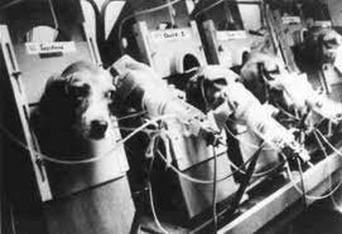 Beagles Used in Tobacco Research
Beagles Used in Tobacco Research
Phillip Morris Kills Animals
It’s well-established that the Center for Consumer Freedom protects the interests of the factory farming industry, but the truth is, the CCF isn't doing companion animals any favors either. The Center for Consumer Freedom runs interference for a lot of different types of animal enterprises, and over the years, a lot of dogs and cats have been lost in the bargain.
In 1966, nearly a decade after the US Surgeon General declared a link between cancer and tobacco smoking, Phillip Morris began “Project 6900,” a series of physiological studies designed to privately “advise Phillip Morris as related to smoking and smoking products” in “the production and development of a new cigarette product.” Using several sets of skin painting and inhalation studies on animals of almost every stripe, Phillip Morris’ researchers set out to build the foundation for what would become the tobacco industry’s ongoing full-frontal assault on claims that smoking was causing cancer and other diseases in humans.
A decade later it was discovered that Covance Laboratories was conducting horrendous forced smoking experiments on beagles--on the tobacco industry's behalf. And later, during the 1990’s, simultaneously to the US Surgeon General reporting that exposure to secondhand smoke substantially increases the risks for lung cancer and heart disease in humans, Covance was generating tobacco-industry sponsored research claiming that even extreme amounts of secondhand cigarette smoke were safe, and they were torturing a lot of defenseless animals to accomplish it.
Which would explain why a tobacco company might be motivated to purchase $2.3 million dollars-worth of interest in an industry front group that seemingly targets “anti-meat” activist organizations on behalf of the food and beverage industry. Phillip Morris tests its tobacco products on animals, lots of animals, and over the span of several decades, the largest producer of tobacco products has cultivated a close relationship with the largest producer of dogs exploited for biomedical research--Covance Laboratories. A lot of smokers were dying from cancer, and Phillip Morris needed to produce scientific “proof” that cigarettes weren't killing them. Their exploitation of animals to forward “product development” would put the tobacco company squarely in PETA’s cross-hairs.
The Center for Consumer Freedom comes at PETA because the animal rights group threatens the financial interests of its stakeholders. In 2001, claiming ownership of 114 shares of Altria (owners of Phillip Morris) common stock, PETA filed a shareholder resolution demanding that the tobacco company cease its use of animals in its barbaric product testing.
From April 26, 2004, to March 11, 2005, an undercover investigator for PETA videotaped systematic abuse and neglect of animals at Covance Laboratories' facility in Vienna, Virginia. The resolution failed to pass, but the tactic was effective in providing a new forum in which to present the animals rights group’s research to company executives, their shareholders, and to the public.
The number fluctuates, but PETA holds stock in as many as 100 companies at any one given time, providing the animal rights group with internal access to corporations that exploit animals, many of whom are on the Center for Consumer Freedom’s donor list. Clearly Richard Berman’s clients consider PETA to be a serious problem.
It’s well-established that the Center for Consumer Freedom protects the interests of the factory farming industry, but the truth is, the CCF isn't doing companion animals any favors either. The Center for Consumer Freedom runs interference for a lot of different types of animal enterprises, and over the years, a lot of dogs and cats have been lost in the bargain.
In 1966, nearly a decade after the US Surgeon General declared a link between cancer and tobacco smoking, Phillip Morris began “Project 6900,” a series of physiological studies designed to privately “advise Phillip Morris as related to smoking and smoking products” in “the production and development of a new cigarette product.” Using several sets of skin painting and inhalation studies on animals of almost every stripe, Phillip Morris’ researchers set out to build the foundation for what would become the tobacco industry’s ongoing full-frontal assault on claims that smoking was causing cancer and other diseases in humans.
A decade later it was discovered that Covance Laboratories was conducting horrendous forced smoking experiments on beagles--on the tobacco industry's behalf. And later, during the 1990’s, simultaneously to the US Surgeon General reporting that exposure to secondhand smoke substantially increases the risks for lung cancer and heart disease in humans, Covance was generating tobacco-industry sponsored research claiming that even extreme amounts of secondhand cigarette smoke were safe, and they were torturing a lot of defenseless animals to accomplish it.
Which would explain why a tobacco company might be motivated to purchase $2.3 million dollars-worth of interest in an industry front group that seemingly targets “anti-meat” activist organizations on behalf of the food and beverage industry. Phillip Morris tests its tobacco products on animals, lots of animals, and over the span of several decades, the largest producer of tobacco products has cultivated a close relationship with the largest producer of dogs exploited for biomedical research--Covance Laboratories. A lot of smokers were dying from cancer, and Phillip Morris needed to produce scientific “proof” that cigarettes weren't killing them. Their exploitation of animals to forward “product development” would put the tobacco company squarely in PETA’s cross-hairs.
The Center for Consumer Freedom comes at PETA because the animal rights group threatens the financial interests of its stakeholders. In 2001, claiming ownership of 114 shares of Altria (owners of Phillip Morris) common stock, PETA filed a shareholder resolution demanding that the tobacco company cease its use of animals in its barbaric product testing.
From April 26, 2004, to March 11, 2005, an undercover investigator for PETA videotaped systematic abuse and neglect of animals at Covance Laboratories' facility in Vienna, Virginia. The resolution failed to pass, but the tactic was effective in providing a new forum in which to present the animals rights group’s research to company executives, their shareholders, and to the public.
The number fluctuates, but PETA holds stock in as many as 100 companies at any one given time, providing the animal rights group with internal access to corporations that exploit animals, many of whom are on the Center for Consumer Freedom’s donor list. Clearly Richard Berman’s clients consider PETA to be a serious problem.
Big Trouble for Covance Laboratories Equals Victory for PETA
"2014 was supposed to be the year that contract testing laboratory Covance opened the doors to a new facility in Prince William County; but reduced reliance on animals (thanks in large part to the heroic work of PETA's Regulatory Testing Division and its fearless leader, Jessica Sandler in pushing for the development, validation, and implementation of non-animal tests) dried up demand for Covance's 'services' (read: force-feeding of chemicals to dogs, monkeys, rabbits, mice, rats, and other animals in painful and lethal tests) and Covance was forced to pull the plug on its construction plans. Whatever else happens in 2014, this is a pretty great victory!"--PETA's Senior Researcher, Alka Chanda
 Covance Maricopa County Demolition
(Photo Credit Roger Snyder)
Covance Maricopa County Demolition
(Photo Credit Roger Snyder)
In November of 2010, Washington Post staff writer, Jennifer Buske reported that, "Struggling with a lack of demand, drug manufacturing services firm Covance will not open a planned $175 million laboratory in Prince William County and will close its Vienna site, laying off more than 200 employees, company officials said last week."
Inside Nova reported January of 2014 that the Maricopa County plant is finally coming down, having never tortured or maimed a single animal.
"Initially, 2014 was supposed to be the year bioscience research firm Covance would bring the last of about 550 high-paying jobs to Prince William County via its new $175 million research lab at Innovation Park.
"Instead, Covance began work earlier this month to dismantle the partially built steel structure that would have housed the lab -- had it not fallen victim to the Great Recession and related excesses in lab capacity in the drug-development market."--Jill Palermo, Inside Nova
While Covance still kills animals, they kill a lot less of them, thanks in no small part to PETA's research development efforts.
Inside Nova reported January of 2014 that the Maricopa County plant is finally coming down, having never tortured or maimed a single animal.
"Initially, 2014 was supposed to be the year bioscience research firm Covance would bring the last of about 550 high-paying jobs to Prince William County via its new $175 million research lab at Innovation Park.
"Instead, Covance began work earlier this month to dismantle the partially built steel structure that would have housed the lab -- had it not fallen victim to the Great Recession and related excesses in lab capacity in the drug-development market."--Jill Palermo, Inside Nova
While Covance still kills animals, they kill a lot less of them, thanks in no small part to PETA's research development efforts.
What Every Activist Should Know About the Center for Consumer Freedom
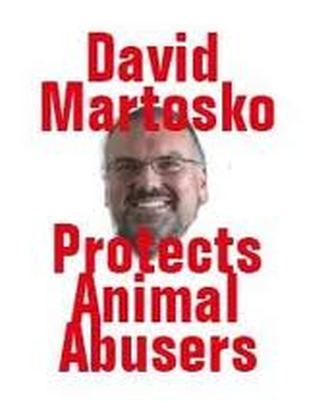
In 2011, the Center for Consumer Freedom's former Director of Research, David Martosko, posed as an animal rights activist in several online forums, with the purpose of gathering intelligence on actual animal rights activists. This revelation is immortalized in a deposition Martosko gave during a recent lawsuit where he and the Center for Consumer Freedom were defendants in a defamation suit against--you guessed it--an animal rights activist and his affiliate organization. There's nothing the Center for Consumer Freedom won't stoop to to undermine the animal rights movement, including cultivating an "animal protection" Manchurian Candidate. Thanks to the small, dedicated group of activists at HumaneWatch.Info keeping track of the Center for Consumer Freedom's dubious activities, an extensive record of Martosko's attack on the animal protection community exists.
"As Gregory Davis, Martosko posted about stereotypically lefty, vegan, and animal activist subjects, such as “living in a wood hut” and hanging out with his “freegan crew,” and friended progressive activists and groups such as PETA, the Humane Society of the United States, Mercy for Animals, Sea Shepherd, and Stop Humane Watch, a group that aimed to monitor and push back on Martosko’s outfit. Many of the individuals Gregory Davis friended were later profiled on a CCF website devoted to monitoring animal rights activists." Washington Post
"Martosko had a tackle box full of bait. One of his strategies was to advocate violence against certain farms and monitor how his “friends” responded. ”He was trying to rile up people,” remarked one investigator. Research by Mother Jones indicates that he was posing under false identities in order to “rile up” animal rights activists since 2001. Martosko is currently leaving the Daily Caller in order to become the US political editor for the Daily Mail in the UK." James McWilliams
"As Gregory Davis, Martosko posted about stereotypically lefty, vegan, and animal activist subjects, such as “living in a wood hut” and hanging out with his “freegan crew,” and friended progressive activists and groups such as PETA, the Humane Society of the United States, Mercy for Animals, Sea Shepherd, and Stop Humane Watch, a group that aimed to monitor and push back on Martosko’s outfit. Many of the individuals Gregory Davis friended were later profiled on a CCF website devoted to monitoring animal rights activists." Washington Post
"Martosko had a tackle box full of bait. One of his strategies was to advocate violence against certain farms and monitor how his “friends” responded. ”He was trying to rile up people,” remarked one investigator. Research by Mother Jones indicates that he was posing under false identities in order to “rile up” animal rights activists since 2001. Martosko is currently leaving the Daily Caller in order to become the US political editor for the Daily Mail in the UK." James McWilliams
Positioning David Martosko as an Editor at the Daily Caller, and Subsequently at the Daily Mail, Allows the Center for Consumer Freedom to Flood Top Tier Media Outlets with "PETA Kills Animals" Press Releases
All "PETA Kills Animals" Roads Lead Back to the Center for Consumer Freedom

Though Penn and Teller's "PETA" "Bullshit" episode pre-dates the Center for Consumer Freedom's official launch of the "PETA Kills Animals" hoax, the earliest anti-PETA press release published on the Center for Consumer Freedom's website, "PETA's Pig Tale" is dated January 20, 2000, indicating that the animal rights group has been on the CCF's radar for a considerable amount of time. Nearly all of the Center for Consumer Freedom's various anti-PETA campaigns are chronicled in the "PETA" episode of "Bullshit," and David Martosko himself makes an appearance at about the five minute marker.
Other industry front groups make an appearance during the episode as well. Patti Strand is the Director of the National Animal Interest Alliance, a Portland Oregon-based front group and industry funded lobbying organization with animal commerce and agriculture clients. The NAIA's agendas include protection of animal enterprise' financial interests, legislation and public relations for farm animal agribusiness, commercial animal breeding, hunting, fishing, trapping, fur ranching, animal testing, horse slaughter, rodeos, circuses and entertainment.
Other industry front groups make an appearance during the episode as well. Patti Strand is the Director of the National Animal Interest Alliance, a Portland Oregon-based front group and industry funded lobbying organization with animal commerce and agriculture clients. The NAIA's agendas include protection of animal enterprise' financial interests, legislation and public relations for farm animal agribusiness, commercial animal breeding, hunting, fishing, trapping, fur ranching, animal testing, horse slaughter, rodeos, circuses and entertainment.
David Martosko's Not the Only CCF Official Who Likes to Play Dress-Up
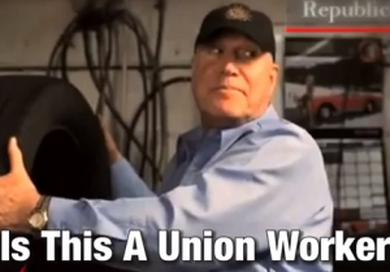
"One of the most anti-worker lobbyists in Washington, D.C. ran an anti-union ad during last week’s Super Bowl and had the nerve to put himself in the commercial playing a hardworking auto mechanic. It was the gold watch and manicure that gave him away.
"Meet Richard Berman. He’s been a regular front man for big business and industry through his lobbying efforts and numerous misleading campaigns against consumer safety and environmental groups. Through his firm, Berman and Company, Berman has fought unions, Mothers Against Drunk Driving, PETA and other watchdog groups in their efforts to raise awareness about obesity, the minimum wage, the dangers of smoking, mad cow disease, drunk driving, and other causes. Berman runs at least 23 industry-funded front groups and projects, such as the Center for Union Facts and holds 24 “positions” in those organizations…"--Exposed: Anti-Worker Lobbyist Poses as Worker in Super Bowl Ad (VIDEO)
"Meet Richard Berman. He’s been a regular front man for big business and industry through his lobbying efforts and numerous misleading campaigns against consumer safety and environmental groups. Through his firm, Berman and Company, Berman has fought unions, Mothers Against Drunk Driving, PETA and other watchdog groups in their efforts to raise awareness about obesity, the minimum wage, the dangers of smoking, mad cow disease, drunk driving, and other causes. Berman runs at least 23 industry-funded front groups and projects, such as the Center for Union Facts and holds 24 “positions” in those organizations…"--Exposed: Anti-Worker Lobbyist Poses as Worker in Super Bowl Ad (VIDEO)
One Out of Every Four Activists Could Be a Corporate Spy
The Center for Consumer Freedom Really Doesn't Mind if Animals' Remains End Up in Trash Bags, as Long as Consumers are the Ones Putting Them There
Rachel Maddow Confronts Rick Berman About the Center for Consumer Freedom
David Martosko: Guest Speaker at the 2012 Alcohol, Tobacco, and Firearms Party
We humans are very quick thinkers. Especially when we're being encouraged to arrive at a conclusion we want to arrive at, and we're able to reasonably justify arriving at that conclusion. Or at least that's how the Psychology Department at Princeton University describes the principles of "motivated reasoning."
While it may seem counter-intuitive (because "facts are facts," right?) "motivated reasoning" is precisely why we have such polarized views on certain major issues. So while we're quick thinkers, we're not especially objective thinkers. According to the science, we bring a lot of biases to the table when determining which side of the "facts" we'll land on.
The Center for Consumer Freedom's various disinformation campaigns are effective because they leave their audiences feeling informed, even though they've been given very little real information. And of course, finding the right audience is key. The Center for Consumer Freedom isn't going to sell their "global warming doesn't exist, and if it does exist it's not our fault" message to an audience of environmentalists, but they can sell it to consumers who want to drive gas-guzzling cars, and eat meat. And while David Martosko has certainly worn out his welcome with regards to animal rights activists, he was a well-received guest speaker at the 2012 Alcohol, Tobacco, and Firearms Party gathering.
While it may seem counter-intuitive (because "facts are facts," right?) "motivated reasoning" is precisely why we have such polarized views on certain major issues. So while we're quick thinkers, we're not especially objective thinkers. According to the science, we bring a lot of biases to the table when determining which side of the "facts" we'll land on.
The Center for Consumer Freedom's various disinformation campaigns are effective because they leave their audiences feeling informed, even though they've been given very little real information. And of course, finding the right audience is key. The Center for Consumer Freedom isn't going to sell their "global warming doesn't exist, and if it does exist it's not our fault" message to an audience of environmentalists, but they can sell it to consumers who want to drive gas-guzzling cars, and eat meat. And while David Martosko has certainly worn out his welcome with regards to animal rights activists, he was a well-received guest speaker at the 2012 Alcohol, Tobacco, and Firearms Party gathering.
David Martosko and Alex Jones Commiserate About PETA
Give Alex Jones the ball, and the man will run with it. While Martosko pretty much sticks to the "PETA kills animals" script, Jones steals the show with his ever-changing anti-PETA anecdotes.
Oh, Yeah, and Alex Jones is "This" Guy
Learn More About the Center for Consumer Freedom Here
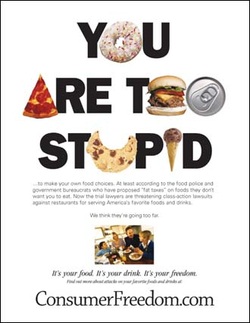
Credit: Center for Consumer Freedom
- The Truth About the Center for Consumer Freedom~Website
- "Activists Have No Business Promoting the Agenda of Corporate Lobbyists" AELLA Article about the Center for Consumer Freedom
- The Center for Consumer Freedom's Interview with Nathan Winograd
- Front Group King Rick Berman Gets Blasted by his Son, David Berman" Article
- Berman and Company Exposed~Website
- Richard Berman Cares about Animals: Clients Exposed~Website
- "Meet Rick Berman, AKA 'Dr. Evil'" 60 Minutes Article
- Center for Consumer Freedom...Or Deception: You Decide~Website
- Rachel Maddow Confronts Rick Berman~Video
- Humanewatch Info~Website
